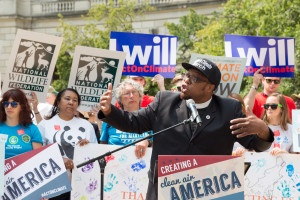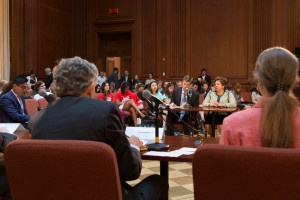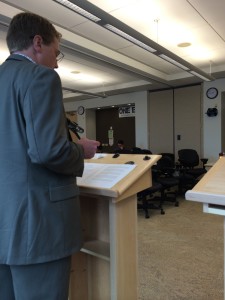We have much more to do and your continued support is needed now more than ever.
Supporters far Outnumber Opponents at EPA Clean Power Plan Hearings

At the D.C. hearing, testifiers in support of the Clean Power Plan outnumbered those opposed by a margin of EIGHT to ONE, and more than 250 people showed up to our rally at EPA headquarters. Senators Ed Markey (D-MA), Jeff Merkley (D-OR), Ben Cardin (D-MD) and Bernie Sanders (D-VT), Representatives Anna Eshoo (D-CA, 18th) and Linda Sanchez (D-CA, 38th),and Delaware’s Governor Jack Markell all came down to testify in support of the Plan as well.
In Denver, supportive testimony outnumbered those opposed by FIVE to ONE and more than 300 people attended the supportive rallies. And in Atlanta, supporters outnumbered opponents by TWO to ONE and the rally was bursting at the seams with more than 400 people. The Pittsburgh hearing is still wrapping up today, but on the first day, supportive testimony outnumbered opposing testimony by TEN to ONE! And although the coal industry went all-in in Pittsburgh, turning out many coal miners for a large rally, our side turned still had a great rally of 400 supporters. So, overall, supportive testimony far outnumbered opposing testimony, demonstrating strong support for EPA to finalize and implement a strong Clean Power Plan!

NWF staff and partners also put in huge amounts of effort in Colorado, Georgia, Ohio, Michigan and DC. NWF’s testimony elevated the stories of of sportsmen, conservationists, young professionals, business leaders, health professionals, state regulators, professional athletes, faith leaders, and more. These stories were so good, we wanted to share some of the highlights:

“Montana is an outdoor state, and we see firsthand the impacts that global warming is having on our lands, waters, fish and wildlife. This fact – documented by an overwhelming global scientific consensus – is playing out in very real ways in the Treasure State. Precipitation patters are changing. Wildlife are more frequent and more intense. Drought is more common and more severe. Vegetation patterns are changing. Snowpack levels are down. Runoff is happening earlier, disrupting seasonal streamflow patters, Water temperatures in our rivers and streams are rising.
All of these changes are having a very real impact on the ability of Montanans to hunt, fish, and enjoy our state’s outdoors. Changes in vegetation are altering habitat for big game. Hunters report that the animals just aren’t where they used to be. Warmer temperatures in September are making life difficult for bow-hunters, who can’t find animals and can’t pack out game without spoilage. Direr conditions in the Prairie Pothole region are impacting waterfowl hunters and bird watchers. Higher water temperatures and diminished streamflows are stressing fish, forcing river closures during what used to be the peak of the fishing season. These changes are affecting the ability of people to hunt, fish and otherwise enjoy our wildlife resources, ultimately undercutting out state’s multi-billion dollar outdoor economy.”

Rue Map, Founder of Outdoor Afro, Member of NWF California Advisory Council and recipient of NWF’s 2014 National Conservation Achievement Award for Communications, traveled all the way from Oakland, California to present testimony at the Denver hearing:
“Through Outdoor Afro in California and around the country, I am able to witness the wonder and magic of children and families engaging with our wild spaces– here is the face of Emma experiencing snow with her mother Barbara for the first time in California’s Sierras in the winter of 2012. As you know, time in nature like this is a treasured experience, and a spark that can help ignite a passion for conservation for a lifetime.
Unfortunately this same experience was not able to be shared last winter because of record low snowfall that cancelled this same event, and foreshadowed our current severe drought and fire conditions.
You can see a glimpse of why I applaud and feel so relieved by the possibility of the EPA to take on much needed steps to reverse the course we are on.”
David White, Director of NWF’s Gulf of Mexico Restoration Campaign traveled from Florida to present testimony at the Atlanta hearing:
“As devastating as the [BP] oil spill was, climate change and ocean acidification from carbon pollution are still the largest threats facing our coastal fish and wildlife resources, marine ecosystems, and coastal communities. If we fail to dramatically reduce carbon pollution, accelerating climate change and ocean acidification could eventually undermine all of our restoration efforts, waste literally tens of billions in restoration dollars, escalate degradation of important coastal ecosystems, and increase threats to entire coastal communities.”
Ida Sargent, 2014 Winter Olympian in cross-country skiing, sent testimony to the D.C. hearing which was read by NWF staffer, Mollie Simon:
“Competing in the Olympics for Team USA was a dream come true but also part of a long journey and countless hours of hard work. Along the way, I have seen many changes to our winters and thus the sport that I love. Every winter, the first snowfall happens a little later, and the January thaw lasts a little longer. At home in Vermont, ski areas are being forced to expand their snowmaking capacity in order to keep up with the warming climate. Not only does this create a financial burden for one of the state’s largest industries, it also pulls from the joy of being able to actually cross country ski across the pristine landscapes which make up the Green Mountains. This is not just an isolated problem for Vermont or our country. Last year on the international racing circuit, I competed for the US Ski Team in World Cup and Olympic races in eleven countries – and raced on manmade snow in every single one of them. Lack of snow caused race courses to be shortened to small loops of artificial snow, which only perpetuates the problem.
I have witnessed changing winters and the effects of extreme weather fueled by climate change both in local communities of Vermont and across the globe, and I applaud EPA for taking much needed steps to address the course we are on. Thank you for the opportunity to share my experiences and I look forward to seeing the change which the Clean Power Plan will spark. I hope to continue to ski across snowy landscapes in Vermont for many winters to come, and to share my passion for the sport with future generations. “
![]() Take action to add your voice and urge the EPA to strengthen and finalize this important rule.
Take action to add your voice and urge the EPA to strengthen and finalize this important rule.





















